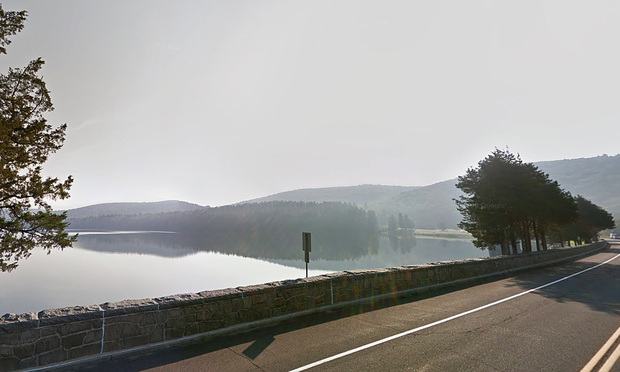Appeals Court Upholds Government Immunity in Tossing Barkhamsted Lake Drowning Lawsuit
The panel rejected claims that governmental immunity didn't apply because employees knew about the popularity of the spot where the drowning occurred.
December 13, 2018 at 11:59 AM
3 minute read
 Lake McDonough in Barkhamsted. Photo by Google.
Lake McDonough in Barkhamsted. Photo by Google.
The Connecticut Appellate Court relied on governmental immunity to uphold a lower court's summary judgment dismissing a lawsuit against the Metropolitan District Commission for a drowning on its lake property in Barkhamsted.
In its 3-0 ruling Tuesday, the panel said the family of 23-year-old Andres Burgos was not able to show that employees should have known people might be using an undesignated swimming area on Lake McDonough known as “The Point.” The family attempted to argue government immunity didn't apply because public employees should have known of the danger associated with people swimming in that particular area.
Burgos was swimming with friends when he drowned, according to the family's attorney, Steven Errante of New Haven-based Lynch, Traub, Keefe & Errante.
Burgos' estate claimed the MDC knew people swam in the area. The MDC, the state's sewer and water agency, argued that it had governmental immunity and that Burgos and his friends were trespassing when the incident occurred in July 2011. A fence was put up after the incident to keep people out of the area.
Writing for the court, Chief Judge Alexandra DiPentima said: “We conclude that a group of individuals in an undesignated swimming area, whose presence is unknown to the defendant, cannot be deemed identifiable for the purposes of the identifiable person, immunity harm exception. Accordingly, there is no genuine issue of material fact as to whether the plaintiff's claim is barred by the doctrine of governmental immunity.”
Errante said he wasn't surprised by the ruling.
“The trend has been to almost eliminate any municipal liability,” Errante said. “Towns and entities that are supposed to be taking care of citizens can be negligent with no consequences.”
Errante said the MDC knew for a long time the area where Burgos drowned was a popular place to swim.
“They were constantly trying to stop people from swimming there,” Errante said. ”They had no lifeguards in the area. While they had boat patrols, they were not frequent enough. There were no eyes on that area.”
The area in question is difficult to see from the lake, Errante noted.
With regard to whether Burgos had any liability in his own death, Errante said he would have hoped a jury could have decided that.
“The way the law is structured now, government immunity has taken away the ability for juries to make that decision,” Errante said.
Errante said he has recommended that Burgos' family not appeal to the Connecticut Supreme Court.
“It is so hard to crack government immunity,” Errante said. “There is no real chance the Supreme Court will take the case or, if they did, reverse the decision.”
Burgos was at Lake McDonough for a family member's third birthday party, Errante said. “It's a very sad situation that every time his birthday comes up they will remember Mr. Burgos' death.”
The MDC is represented by Jack Steigelfest and Christopher Harrington of Hartford's Howard, Kohn, Sprague & FitzGerald. Neither attorney responded to a request for comment Wednesday,
Errante was assisted by colleagues Daniel Scholfield and Marisa Bellair.
In addition to DiPentima, Judges Douglas Lavine and Lubbie Harper Jr. concurred.
This content has been archived. It is available through our partners, LexisNexis® and Bloomberg Law.
To view this content, please continue to their sites.
Not a Lexis Subscriber?
Subscribe Now
Not a Bloomberg Law Subscriber?
Subscribe Now
NOT FOR REPRINT
© 2025 ALM Global, LLC, All Rights Reserved. Request academic re-use from www.copyright.com. All other uses, submit a request to [email protected]. For more information visit Asset & Logo Licensing.
You Might Like
View All

‘Undermines the Rule of Law’: Retired US Judges Condemn Trump’s Jan. 6 Pardons

Art of the Settlement: Trump Attorney Reveals Strategy in ABC Lawsuit

‘Really Deflating’: Judges React to Biden Threat to Veto New Judgeships Bill
Trending Stories
- 1Uber Files RICO Suit Against Plaintiff-Side Firms Alleging Fraudulent Injury Claims
- 2The Law Firm Disrupted: Scrutinizing the Elephant More Than the Mouse
- 3Inherent Diminished Value Damages Unavailable to 3rd-Party Claimants, Court Says
- 4Pa. Defense Firm Sued by Client Over Ex-Eagles Player's $43.5M Med Mal Win
- 5Losses Mount at Morris Manning, but Departing Ex-Chair Stays Bullish About His Old Firm's Future
Who Got The Work
J. Brugh Lower of Gibbons has entered an appearance for industrial equipment supplier Devco Corporation in a pending trademark infringement lawsuit. The suit, accusing the defendant of selling knock-off Graco products, was filed Dec. 18 in New Jersey District Court by Rivkin Radler on behalf of Graco Inc. and Graco Minnesota. The case, assigned to U.S. District Judge Zahid N. Quraishi, is 3:24-cv-11294, Graco Inc. et al v. Devco Corporation.
Who Got The Work
Rebecca Maller-Stein and Kent A. Yalowitz of Arnold & Porter Kaye Scholer have entered their appearances for Hanaco Venture Capital and its executives, Lior Prosor and David Frankel, in a pending securities lawsuit. The action, filed on Dec. 24 in New York Southern District Court by Zell, Aron & Co. on behalf of Goldeneye Advisors, accuses the defendants of negligently and fraudulently managing the plaintiff's $1 million investment. The case, assigned to U.S. District Judge Vernon S. Broderick, is 1:24-cv-09918, Goldeneye Advisors, LLC v. Hanaco Venture Capital, Ltd. et al.
Who Got The Work
Attorneys from A&O Shearman has stepped in as defense counsel for Toronto-Dominion Bank and other defendants in a pending securities class action. The suit, filed Dec. 11 in New York Southern District Court by Bleichmar Fonti & Auld, accuses the defendants of concealing the bank's 'pervasive' deficiencies in regards to its compliance with the Bank Secrecy Act and the quality of its anti-money laundering controls. The case, assigned to U.S. District Judge Arun Subramanian, is 1:24-cv-09445, Gonzalez v. The Toronto-Dominion Bank et al.
Who Got The Work
Crown Castle International, a Pennsylvania company providing shared communications infrastructure, has turned to Luke D. Wolf of Gordon Rees Scully Mansukhani to fend off a pending breach-of-contract lawsuit. The court action, filed Nov. 25 in Michigan Eastern District Court by Hooper Hathaway PC on behalf of The Town Residences LLC, accuses Crown Castle of failing to transfer approximately $30,000 in utility payments from T-Mobile in breach of a roof-top lease and assignment agreement. The case, assigned to U.S. District Judge Susan K. Declercq, is 2:24-cv-13131, The Town Residences LLC v. T-Mobile US, Inc. et al.
Who Got The Work
Wilfred P. Coronato and Daniel M. Schwartz of McCarter & English have stepped in as defense counsel to Electrolux Home Products Inc. in a pending product liability lawsuit. The court action, filed Nov. 26 in New York Eastern District Court by Poulos Lopiccolo PC and Nagel Rice LLP on behalf of David Stern, alleges that the defendant's refrigerators’ drawers and shelving repeatedly break and fall apart within months after purchase. The case, assigned to U.S. District Judge Joan M. Azrack, is 2:24-cv-08204, Stern v. Electrolux Home Products, Inc.
Featured Firms
Law Offices of Gary Martin Hays & Associates, P.C.
(470) 294-1674
Law Offices of Mark E. Salomone
(857) 444-6468
Smith & Hassler
(713) 739-1250










